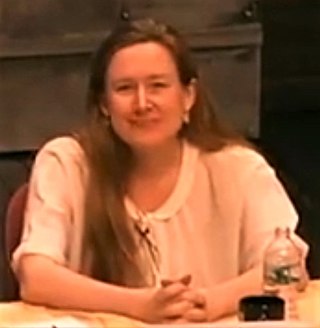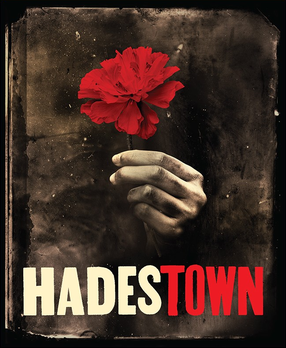
Orpheus in the Underworld and Orpheus in Hell are English names for Orphée aux enfers, a comic opera with music by Jacques Offenbach and words by Hector Crémieux and Ludovic Halévy. It was first performed as a two-act "opéra bouffon" at the Théâtre des Bouffes-Parisiens, Paris, on 21 October 1858, and was extensively revised and expanded in a four-act "opéra féerie" version, presented at the Théâtre de la Gaîté, Paris, on 7 February 1874.
Eurydice is a 2003 play by Sarah Ruhl which retells the myth of Orpheus from the perspective of Eurydice, his wife. The story focuses on Eurydice's choice to return to Earth with Orpheus or to stay in the underworld with her father. Ruhl made several changes to the original myth's story-line. The most noticeable of these changes was that in the myth Orpheus succumbs to his desires and looks back at Eurydice, while in Ruhl's version Eurydice calls out to Orpheus perhaps in part because of her fear of reentering the world of the living and perhaps as a result of her desire to remain in the land of the dead with her father. Ruhl's script has been explicitly written so as to be a playground for the designer of the sets.
In Greek mythology, Eurydice is the wife of the musician Orpheus.
Mary Zimmerman is an American theatre and opera director and playwright from Nebraska. She is an ensemble member of the Lookingglass Theatre Company, the Manilow Resident Director at the Goodman Theatre in Chicago, Illinois, and also serves as the Jaharis Family Foundation Professor of Performance Studies at Northwestern University.

Sarah Ruhl is an American playwright, poet, professor, and essayist. Among her most popular plays are Eurydice (2003), The Clean House (2004), and In the Next Room (2009). She has been the recipient of a MacArthur Fellowship and the PEN/Laura Pels International Foundation for Theater Award for a distinguished American playwright in mid-career. Two of her plays have been finalists for the Pulitzer Prize for Drama and she received a nomination for Tony Award for Best Play. In 2020, she adapted her play Eurydice into the libretto for Matthew Aucoin's opera of the same name. Eurydice was nominated for Best Opera Recording at the 2023 Grammy Awards.
Rodney Gilfry is a leading American operatic baritone. After launching his career at Frankfurt Opera in 1987, Gilfry quickly established a reputation for stylish singing and acting. A renowned Mozart specialist, he has given acclaimed performances as Don Giovanni, Count Almaviva, Guglielmo, and Papageno, and is also known for his work in roles from the standard baritone repertoire.

Danielle de Niese is an Australian-American lyric soprano. After success as a young child in singing competitions in Australia, she moved to the United States where she developed her operatic career. From 2005 she came to widespread public attention with her performances as Cleopatra in Giulio Cesare at Glyndebourne Festival Opera, England.

The ancient legend of Orpheus and Eurydice concerns the fateful love of Orpheus of Thrace for the beautiful Eurydice. Orpheus was the son of Oeagrus and the muse Calliope. It may be a late addition to the Orpheus myths, as the latter cult-title suggests those attached to Persephone. The subject is among the most frequently retold of all Greek myths, being featured in numerous works of literature, operas, ballets, paintings, plays and more recently, films and video games.
Orfeo (Orpheus) is an opera in three acts by the Italian composer Antonio Sartorio. The libretto, by Aurelio Aureli, is based on the myth of Orpheus and Eurydice. It was first performed at the Teatro San Salvatore, Venice in 1672. With its clear division between arias and recitative, the work marks a transition in style between the Venetian opera of Francesco Cavalli and the new form of opera seria. Modern reactions to the work have been mixed, with Tim Carter describing it as "a fairly dismal example of a genre with all the symptoms of terminal decline...[Orfeo]'s journey to Hades seems almost a Sunday-school outing...Whether satire or not, this is indeed a sorry tale."

In Greek mythology, Orpheus was a Thracian bard, legendary musician and prophet. He was also a renowned poet and, according to the legend, travelled with Jason and the Argonauts in search of the Golden Fleece, and even descended into the underworld of Hades, to recover his lost wife Eurydice.
Barry Banks is a Grammy Nominated English/American lyric tenor who, after a long association with The Metropolitan Opera and English National Opera, has achieved acclaim as one of finest interpreters of the Italian bel canto repertoire.

Eurydice was a character in Greek mythology and the Auloniad wife of Orpheus, whom Orpheus tried to bring back from the dead with his enchanting music.

Hadestown is the fourth studio album by American folk singer-songwriter Anaïs Mitchell, and was released by Righteous Babe Records on March 9, 2010. The concept album, which became the basis for the stage musical of the same name, follows a variation on the ancient Greek myth of Orpheus and Eurydice, where Orpheus must embark on a quest to rescue his wife Eurydice from the underworld. It has been advertised as a "folk opera". Several of the songs feature singers other than Mitchell, including Justin Vernon, Ani DiFranco, Greg Brown, Ben Knox Miller and Tanya, Petra and Rachel Haden.

The Corridor is a chamber opera composed by Harrison Birtwistle to an English language libretto by David Harsent. It premiered at the Aldeburgh Festival on 12 June 2009. The title refers to the corridor through which Orpheus and Eurydice passed as he was leading her from the underworld.
John Thomas Holiday Jr. is an American operatic countertenor. His repertoire focuses on the Baroque and contemporary composers, including staged opera and opera in concert, works for voice and orchestra, and experimental mixed-media. He has participated in several world premieres. He has performed with several opera companies in the United States, toured with the Los Angeles Philharmonic, and sung in Shanghai and several European cities. He also sings gospel, pop, and jazz; he was a contestant on season 19 of NBC's The Voice, a vocal competition television series.

Matthew Aucoin is an American composer, conductor, pianist, and writer best known for his operas. Aucoin has received commissions from the Metropolitan Opera, Carnegie Hall, Lyric Opera of Chicago, the American Repertory Theater, the Peabody Essex Museum, Harvard University, and NPR's This American Life. He was appointed as Los Angeles Opera's first-ever Artist-in-Residence in 2016. He is a 2018 MacArthur Fellow.

Hadestown is a sung-through musical with music, lyrics, and book by Anaïs Mitchell. It tells a version of the ancient Greek myth of Orpheus and Eurydice. Eurydice, a young girl looking for something to eat, goes to work in a hellish industrial version of the Greek underworld to escape poverty and the cold, and her poor singer-songwriter lover Orpheus comes to rescue her.

Jakub Józef Orliński is a Polish operatic countertenor singer and breakdancer. He has performed leading roles with many opera companies, including Metropolitan Opera, Royal Opera House, Warsaw Grand Theatre and Oper Frankfurt.
Erin Morley is an American operatic soprano.











